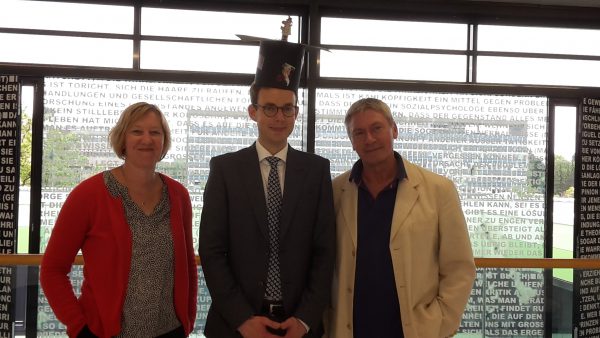“Attention, please!” - New journal article about the tabloidization of campaign coverage in print newspapers
06.06.2017
“This infinite, desperate and creeping trivialization destroys the brain.” With these words, the former
German Federal President Roman Herzog underlined his worries about the intensified tabloidization of political news coverage. Until now, this potential long-term trend has hardly been empirically investigated. In one of the first cross-national long-term studies, now published in Journalism, Melanie Magin shows that the concerns are at least in parts exaggerated: Her article "Attention, please! Structural Influences on Tabloidization of Campaign Coverage in German and Austrian Elite Newspapers (1949-2009)" shows that tabloidization of campaign coverage in German and Austrian Elite Newspapers has only marginally grown within 60 years and is still on a very low level at the end of the period under investigation.
Congratulations to Philipp Weichselbaum!
28.05.2017
Philipp Weichselbaum, former research assistant at the Division of Media Convergence, successfully defended his dissertation on 19th May 2017. The title of his doctoral thesis is “Öffentlicher Druck – Theoretische Grundlegung und empirische Analyse am Beispiel von Rücktritten deutscher Bundesminister (1960-2013)” [Public Pressure – Theoretical Groundwork and empirical Analysis through the Examples of Resignations of German Federal Ministers (1960-2013)].
The thesis takes up the conceptualization of the theory of public pressure from the perspective of communication studies and augments it through a content analysis of 16 resignations of Federal Ministers from 1960 to 2013 – from Oberländer and Krüger to zu Guttenberg and Schavan. Its main focus is whether and how public pressure is able to force a minister into resignation. To answer this question, specific dynamics and patterns in the news coverage of each resignation case are summarized and reviewed in a longitudinal comparison. The ambitious research design shows new and exciting perspectives on the interactions between politics and media – also in the context of the mediatization thesis.
We congratulate Philipp Weichselbaum on his outstanding achievement!
Lecture series “Media Convergence – Meet the Media Executives” with many guest lectures from practice
17.05.2017
 The lecture series “Media Convergence – Meet the Media Executives” under the leadership of Prof. Dr. Birgit Stark and Prof. Dr. Bjørn von Rimscha offers exciting insights into the media business:
The lecture series “Media Convergence – Meet the Media Executives” under the leadership of Prof. Dr. Birgit Stark and Prof. Dr. Bjørn von Rimscha offers exciting insights into the media business:
Continuing the successful format, managers of media companies as well as leaders in politics present digital fields of business, strategies and processes of change.
The list of lecturers include Julia Bönisch (sz.de), Daniel Stich (SPD Rheinland-Pfalz), Matthias Krömer (Vodafone).
The lectures are given on Wednesdays at 12am to 2 pm, lecture hall N2 (“Muschel”- Johann-Joachim-Becher-Weg 23, 55128 Mainz).
Everyone is invited to join!
„Audience fragmentation by information intermediaries: Start of new DFG-Project
22.03.2017
There is a long-standing academic debate about the potential fragmentation of the news landscape as a result of a diversification. The explosion of content on the internet, aided by a proliferation of tools for creation and dissemination, has re-kindled old and ignited new fears. From the users' perspective, online media make highly selective usage easier and thus allow for a more interest-driven news consumption. When evaluated through the lens of democratic theory, previous assessments have been mostly negative, predicting a loss of societal cohesion as the result of a fragmented audience. In addition to the users' own conscious decisions, technical factors have risen as new influences on selectivity. Information intermediaries such as search engines, news aggregators and social networks work as brokers between a supply of content and the users' demand - influencing news selection and hence exposure. They collect, classify and sort content, which in turn influences the "discoverability" of topics. To end-users, they serve as a welcome navigational aids. However, their modes of operation (such as personalization algorithms) enable new potential effects. Even though the current debate is predominantly critical, there is scarcely any hard empirical evidence for either positive or negative effects.
The new DFG-funded project aims to close this research gap. Lead by Prof. Dr. Birgit Stark and together with Pascal Jürgens, the study aims to investigate the influence of intermediaries' logics - both isolated as well as in concert. Its theoretical contribution is a multi-layer network analytical model of individual news selection, which can be used to capture intermediary effects. The empirical core consists of an innovative method combination: In conjunction with a content analysis of top German online news sources, user tracking data reveals citizens' actual news and thus topic exposure. This design for the first time delivers a representative test of the much-discussed filter bubble hypothesis and contributes to the debate about societal consequences of algorithm-based news usage.
“Caught in the echo chamber?” Birgit Stark presents project results in Berlin
01.03.2017
Intermediaries like Facebook and Google have long become important information sources and therefore influence processes for forming political opinions by e.g. having their algorithms filter, evaluate and personalize information. How can we evaluate the risks connected with these algorithms? In how far do they change the function of journalism (to provide orientation and to convey content)? Which responsibilities fall to the providers of intermediaries? And finally: What can be considered an appropriate approach to the regulation of social networks?
These questions are debated at the meeting of the medienanstalten and the Landesanstalt für Medien Nordrhein-Westfalen (LfM) [Media Authority of North Rhine-Westphalia] on 8th March 2017 in Berlin: „Ganz meine Meinung? Politische Meinungsbildung in sozialen Netzwerken“ [Totally my opinion? The forming of political opinions on social network sites]. Birgit Stark will give a presentation on the topic: “Gefangen in der Echokammer? Politische Meinungsbildung auf Facebook” [Caught in the echo chamber? The forming of political opinions on Facebook]. She will present results of the current project “Informationsintermediäre und ihr Einfluss auf Meinungsbildungsprozesse” [Information intermediaries and their influence on the process of forming an opinion] of the Research and Teaching Division for Media Convergence.
Click here to view the program.
